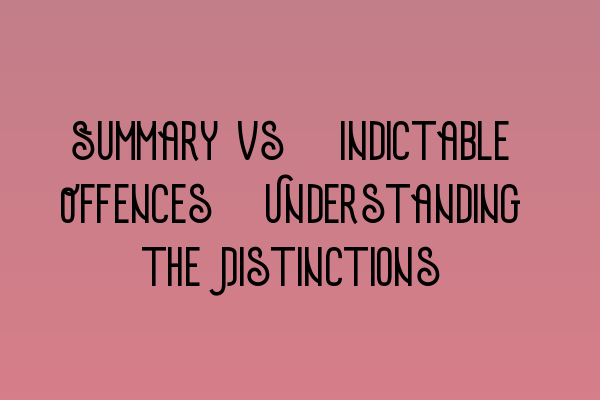Summary vs. Indictable Offences: Understanding the Distinctions
Welcome to the SQE Criminal Law & Practice Law UK blog! In this article, we will delve into the differences between summary offences and indictable offences, helping you understand the distinctions that exist within the legal system. It is important to familiarize yourself with these variations to navigate the complex world of criminal law effectively.
Summary Offences
Summary offences are minor criminal offences that are usually dealt with swiftly by a magistrate rather than a jury. These offences are generally less serious in nature and carry lesser penalties compared to indictable offences. Some common examples of summary offences include minor assaults, public order offenses, and traffic violations.
If you are preparing for your SQE 1 exam, you may find it helpful to test your knowledge with SQE 1 Practice Exam Questions to ensure a thorough understanding of the topic.
Indictable Offences
On the other hand, indictable offences are more serious criminal offences that must be tried before a higher court, such as the Crown Court, and are typically heard by a judge and jury. These offences carry severe penalties, including lengthy custodial sentences. Examples of indictable offences include murder, robbery, and serious sexual offenses.
To enhance your preparation for the SQE 1 exam, make sure to take advantage of SQE 1 Practice Mocks FLK1 FLK2, which will provide valuable insights into the examination format and allow you to gauge your understanding.
Distinguishing Factors
There are several key factors that differentiate summary offences from indictable offences:
- Penalties: Summary offences attract lesser penalties, such as fines, probation, and short-term imprisonment. Indictable offences, on the other hand, carry more significant penalties, including lengthy prison sentences.
- Jurisdiction: Summary offences are usually heard in magistrates’ courts, while indictable offences are handled by higher courts, like the Crown Court.
- Trial Procedure: Summary offences are generally resolved through quick hearings, where a single magistrate makes a decision. Indictable offences, however, involve complex trial proceedings with the involvement of a judge and a jury, and may prolong for several days or weeks.
- Right to Trial: Defendants charged with summary offences do not have an automatic right to a trial by jury. In the case of indictable offences, defendants have the right to choose a trial by jury.
Preparing for SQE Exams
If you are studying for the SQE 1 exam, it is essential to enroll in comprehensive SQE 2 Preparation Courses and SQE 1 Preparation Courses to strengthen your knowledge and improve your chances of success. Our expert tutors will guide you through the intricacies of criminal law and ensure you are adequately prepared for the examinations.
Stay updated on the latest SRA SQE Exam Dates to plan your study schedule efficiently and ensure timely registration for the exams.
We hope this article has shed light on the differences between summary and indictable offences. By understanding these distinctions, you will be better equipped to navigate the criminal justice system as a legal professional.
